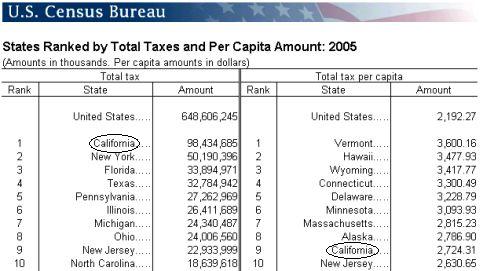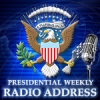 Meathead, and other California Democrats, think that it’s OK to levy additional taxes on hard-working-but-financially-viable Californians. This table gives insight into why raising taxes is a bad idea. In the US Census table below, notice that while California has the largest tax base in the country (and nearly twice that of second-place New York), the tax-per-individual Californian is only in ninth place. It should be obvious that not all 37 million Californians pay the amount shown; the higher-income folks carry a disproportionately large burden, while many in the state (and ALL illegal immigrants) pay no income tax at all. Those of us who earn decent wages suffer the highest tax burden in America.
Meathead, and other California Democrats, think that it’s OK to levy additional taxes on hard-working-but-financially-viable Californians. This table gives insight into why raising taxes is a bad idea. In the US Census table below, notice that while California has the largest tax base in the country (and nearly twice that of second-place New York), the tax-per-individual Californian is only in ninth place. It should be obvious that not all 37 million Californians pay the amount shown; the higher-income folks carry a disproportionately large burden, while many in the state (and ALL illegal immigrants) pay no income tax at all. Those of us who earn decent wages suffer the highest tax burden in America.

I am sick-to-death of the freaking “Robin Hood” mentality of stealing wealth from those who earn it and giving it to those who don’t.

 Did you know that in the list of the ten richest Americans, two are Microsoft executives, and five are named Walton? In fact, if Sam Walton had only one heir, that person would be at the top of the list.
Did you know that in the list of the ten richest Americans, two are Microsoft executives, and five are named Walton? In fact, if Sam Walton had only one heir, that person would be at the top of the list. THE PRESIDENT: Good morning. 2005 has been a year of strong progress toward a freer, more peaceful world and a more prosperous America. This year we watched the Iraqi people defy the terrorists and suicide bombers and hold three successful elections, voting to choose the only constitutional, democratic government in the Arab world. We also saw the people of Afghanistan elect a democratic parliament in a nation that only a few years ago was ruled by the Taliban.
THE PRESIDENT: Good morning. 2005 has been a year of strong progress toward a freer, more peaceful world and a more prosperous America. This year we watched the Iraqi people defy the terrorists and suicide bombers and hold three successful elections, voting to choose the only constitutional, democratic government in the Arab world. We also saw the people of Afghanistan elect a democratic parliament in a nation that only a few years ago was ruled by the Taliban. As the world’s largest retailer and America’s largest private employer, Wal-Mart inevitably will be the target of criticism. Given the company’s disdain for unions, it’s no wonder unions loathe it so. But what doesn’t make sense is how the unions’ assertion that Wal-Mart is the enemy of poor people has become close to conventional wisdom among Democrats and many journalists. The case for this claim is flimsy.
As the world’s largest retailer and America’s largest private employer, Wal-Mart inevitably will be the target of criticism. Given the company’s disdain for unions, it’s no wonder unions loathe it so. But what doesn’t make sense is how the unions’ assertion that Wal-Mart is the enemy of poor people has become close to conventional wisdom among Democrats and many journalists. The case for this claim is flimsy. As it is, Wal-Mart offers opportunities for motivated individuals and lower prices to the consumer – something that unions, democrats and many journalists hate.
As it is, Wal-Mart offers opportunities for motivated individuals and lower prices to the consumer – something that unions, democrats and many journalists hate.